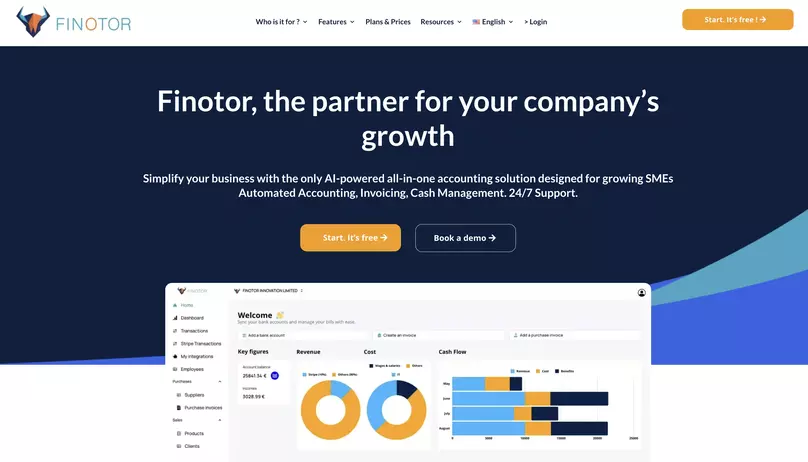Contents
Artificial intelligence (AI ) is no longer the future; it is reshaping the present in every sector, including e-commerce, finance and many others. Despite its pervasive influence, many businesses are still faced with the fundamental question: “How can AI add real value to us? How can AI bring us real added value?
This article explores how AI is revolutionising business models, streamlining operations and improving decision-making processes. We’ll also look at how tools such as Finotor can help manage the financial complexities that accompany the integration of new technologies.
The rise of AI in business
understanding generative AI
Generative AI represents a significant leap forward in the capabilities of artificial intelligence systems. It is a subset of AI technologies that uses machine learning models to generate new content – whether text, images or even executable code – based on patterns and information extracted from vast amounts of existing data. Unlike traditional AI applications that typically automate tasks, generative AI goes further by not only mimicking, but also enhancing human creativity and decision-making processes.
This form of AI relies on deep learning techniques, in particular neural networks, to analyse and learn from data, then apply this knowledge to generate original results. This ability to create and innovate makes generative AI a powerful tool for a range of applications.
For example, in the media industry, it can produce creative and innovative written content or artwork that would take a human artist a long time to develop. In software development, generative AI can write code snippets or even entire programs based on requirements fed into the system, dramatically reducing development time and potentially increasing code quality.
key players and innovations
OpenAI: Several pioneering companies have pushed back the boundaries of what is possible with generative AI. OpenAI, a leader in the field, has developed various iterations of its GPT (Generative Pre-trained Transformer) models. These LLMs (large language models) are capable of generating human-like texts that can converse, answer questions and even write persuasive essays. These capabilities have far-reaching implications for content creation across all sectors, from automating customer service interactions to creating personalised content in marketing campaigns.
Vimeo: Vimeo has integrated AI into its video production tools to simplify and improve the video creation process. Its AI-based solutions facilitate scene recognition, video editing and optimisation of video content for different platforms, streamlining the production process and making high-quality video content more accessible to creators at all levels. This not only saves time and resources, but also democratises high-quality production capabilities, enabling individual creators and small businesses to produce content that is no match for major studio productions.
Adobe and Autodesk: These companies are integrating AI into their software to facilitate the design and creation process. Adobe, for example, has enhanced its products with AI capable of doing everything from refining images to creating complex digital paintings, helping creators to go beyond the traditional boundaries of graphic design and digital art.
Advances in generative AI are not just transforming the way tasks are performed, they are reshaping entire industries. By automating complex and creative processes, AI not only increases efficiency, but also opens up new opportunities for innovation and creativity. As these technologies become more sophisticated and accessible, they will continue to drive significant change in the way businesses operate, providing more personalised and engaging experiences for their customers and creating new value across the digital economy.
Transforming business strategies with AI
✅ Improve productivity
In today’s competitive business landscape, leveraging AI to improve productivity is becoming increasingly essential. AI tools are adept at handling a wide range of routine and repetitive tasks across a variety of sectors. For example, in the administrative field, AI can automate tasks such as data entry, making appointments and sorting emails. This automation extends to more complex areas such as customer relationship management, where AI systems can track interactions, analyse customer feedback and even predict customer behaviour with great accuracy.
The integration of AI in these areas is significantly boosting productivity by streamlining processes that traditionally required significant human effort. For example, AI-driven analytics platforms can process and analyse large volumes of data in real time, providing businesses with actionable insights far faster than is humanly possible. This rapid processing capability enables companies to react more quickly to market changes, adjust their strategies on the fly and maintain their competitive edge.
What’s more, by automating mundane tasks, companies not only optimise their workflows, they also improve employee satisfaction. Employees are freed from tedious, repetitive tasks and can focus on higher-level, strategic tasks that are more rewarding and make better use of their skills. This change can lead to greater job satisfaction, lower turnover rates and a more motivated workforce, contributing to an overall more positive corporate culture.
✅ Encouraging innovation
AI’s real strength lies in its ability to sift through and analyse massive data sets – far beyond the capacity of human analysts – unearthing valuable insights that can propel innovation across all facets of a business. In product development, AI can identify emerging trends and consumer preferences by analysing social media data, online reviews and other customer interactions. This analysis can inform the development of new products or the improvement of existing ones, ensuring that they better match current market demands.
In marketing, AI tools can transform strategies by enabling hyper-personalised campaigns. AI algorithms analyse customer data to understand their buying behaviours and preferences, which then allows marketing messages to be tailored to each individual consumer. This type of targeted marketing not only improves customer engagement, but also increases the efficiency of marketing spend by reducing the waste associated with poorly targeted efforts.
Customer service is another area where AI is having a significant impact. AI-powered chatbots and virtual assistants can handle large numbers of customer queries without human intervention. These tools learn from each interaction and gradually provide more accurate and useful responses. For businesses, this means longer customer service hours and faster response times, improving customer satisfaction and loyalty.
AI can also drive innovation in operational processes. For example, AI-powered predictive maintenance can predict potential equipment failures before they happen by analysing data from sensors and machine usage. This proactive approach avoids downtime, reduces maintenance costs and extends the life of equipment.
In conclusion, the role of AI in transforming business strategies is profound and multifaceted. By improving productivity and stimulating innovation, AI not only streamlines existing processes, it also opens up new avenues for growth and development. By continuing to embrace AI technologies, businesses will find themselves better equipped to meet the challenges of the modern marketplace, offering improved products and services that meet the heightened expectations of their customers.
✅ Risk management
Identify patterns and predict failures
One of the most critical applications of AI in modern business practice is in the area of risk management. AI systems excel at identifying complex patterns and anomalies that would be almost impossible for humans to detect without in-depth data analysis. By exploiting machine learning algorithms and deep learning networks, AI can sift through huge datasets quickly and efficiently, identifying potential risks that could lead to system failures or operational disruption.
Machine and equipment failures
In industries that rely on heavy machinery and equipment, such as manufacturing, construction and transport, downtime can be incredibly costly. AI-driven predictive maintenance tools analyse data from various sensors embedded in equipment to monitor performance and condition in real time. These tools can predict when a piece of equipment is likely to fail, allowing maintenance to be scheduled at opportune times without disrupting normal operations. This proactive approach not only reduces the costs associated with equipment downtime, but also extends the life of machines, optimising capital investment.
Financial risk assessment
In the financial sector, AI plays a key role in identifying risks associated with investment portfolios and market movements. AI systems analyse historical data and current market conditions to identify potential financial risks, such as credit, liquidity and market risks. By predicting these risks, AI enables financial institutions to take preventative measures, such as adjusting their investment strategies or hedging potential losses. This proactive management can protect the financial health of the organisation and its customers, maintaining investor confidence and compliance with regulatory requirements.
Threats to cyber security
As cyber threats become increasingly sophisticated, AI has become an indispensable cybersecurity ally. AI systems can monitor network traffic and analyse patterns to detect anomalies that may indicate a cyber attack, such as data breaches, phishing attempts or ransomware. By identifying these threats at an early stage, AI enables businesses to quickly implement defensive strategies, significantly reducing potential damage. What’s more, AI-driven security systems are constantly learning from new data, enabling them to stay abreast of the latest threat tactics and improve their effectiveness over time.
Impact on business continuity and reputation
AI’s ability to proactively manage risk has a profound impact on business continuity. By anticipating and mitigating risks before they develop into bigger problems, businesses can maintain operational stability and ensure that their business processes run smoothly. This stability is crucial not only for the bottom line, but also for maintaining customer confidence and satisfaction.
In addition, effective risk management is essential to protect a company’s reputation. In the digital age, a single failure can result in significant reputational damage, which can be costly to repair. By using AI to effectively manage risk, businesses can avoid many of the pitfalls that can lead to PR crises or customer dissatisfaction.
In summary, AI’s role in risk management is transforming the way businesses address potential threats in a variety of areas, from machine maintenance to financial investments and cyber security. This not only protects a company’s resources and reputation, but also gives it a competitive edge by ensuring it can adapt to and mitigate risks quickly and effectively.
Case studies: Real-world applications of AI
✅ Optimising e-commerce
The e-commerce sector has undergone remarkable transformations thanks to AI technologies, which have significantly improved both operational efficiency and customer experience.
Inventory management
One of the most significant impacts of AI in e-commerce concerns inventory management. AI systems use predictive analytics to forecast product demand based on various factors such as seasonal trends, historical sales data and consumer behaviour patterns. This enables retailers to optimise their stock levels, reducing both overstocks and out-of-stocks, minimising warehousing costs and maximising sales opportunities.
Customer interaction
AI has also revolutionised customer interaction on e-commerce platforms. AI-driven chatbots are now commonplace on many websites, offering 24/7 customer service without human intervention. These chatbots can handle a multitude of customer service tasks, from answering FAQs to assisting with the checkout process, and can even provide personalised shopping advice based on the customer’s browsing and purchase history. This not only improves the customer experience by providing instant assistance, but also frees up customer service representatives to deal with more complex issues, improving operational efficiency.
Personalised recommendations
AI also enhances the shopping experience through personalised product recommendations. By analysing individual customer data and wider purchasing trends, AI algorithms can suggest products that a customer is more likely to buy, increasing the likelihood of conversion and boosting sales. This personalised approach not only generates revenue, but also improves customer satisfaction and loyalty.
✅ Financial forecasts
In the area of financial management within e-commerce, the role of AI is becoming increasingly critical, particularly with tools such as Finotor, which are designed to improve financial efficiency and strategic decision-making.


Finotor is available as a “Full Access” free trial: Try Finotor free for 30 days
Market trends and customer behaviour
AI’s ability to analyse large datasets enables it to identify market trends and predict future customer behaviour with remarkable accuracy. For example, AI can detect emerging trends in customer preferences or changes in consumer habits, enabling companies to proactively adjust their marketing and product strategies.
Streamlining financial processes with Finotor
Integrating AI-derived information with financial management tools such as Finotor can significantly improve a company’s ability to manage its finances effectively. Finotor’s platform can automate routine financial tasks such as expense tracking, payroll and budgeting. It also provides advanced analytics that help businesses understand their financial health in real time, offering insight into cash flow, cost management and profitability.
In addition, Finotor can integrate data from a variety of sources, including AI predictions of sales and market trends, to provide a holistic view of the financial implications of those predictions. This enables companies to make more informed decisions quickly, adapt to changing market conditions and capitalise on opportunities as they arise.
Impact on strategic decision-making
By streamlining financial processes and integrating AI-driven data, tools like Finotor enable businesses to make faster, more informed strategic decisions. This capability is crucial in the fast-paced e-commerce environment, where the ability to adapt and respond quickly to market changes can be a significant competitive advantage.
Whether it’s optimising inventory, improving customer interactions or predicting financial trends, the impact of this technology is considerable. By leveraging AI, e-commerce businesses can not only improve operational efficiency, but also deliver enhanced, personalised customer experiences and make strategic decisions based on deep data. Tools like Finotor play a key role in harnessing the power of AI for financial forecasting and management, ensuring that businesses remain competitive and financially sound in the dynamic e-commerce landscape.
Preparing for an AI-driven future
✅ Strengthening AI skills
As artificial intelligence continues to reshape the business landscape, establishing AI skills within organisations is becoming increasingly important. This involves more than adopting new technologies; it requires a holistic approach to embedding AI into the very fabric of the business model.
✅ Training and development
The first step in building AI skills is to invest in comprehensive training and development programmes for employees. This training should cover not only the technical aspects of AI, but also its application in various business functions. For example, marketing teams should understand how AI can improve customer segmentation and personalisation, while finance teams could focus on AI for predictive analytics and risk assessment.
Training programmes should be tiered to cater for different skill levels, so that all employees, whether tech-savvy or less familiar with AI, can find value and improve their skills. In addition, promoting a culture of continuous learning can help keep staff up to date with advances and best practice in AI.
✅ Strategic partnerships
Another crucial element is forming strategic partnerships with technology companies that specialise in AI solutions. These partnerships can provide access to cutting-edge technology and expertise that might be too expensive or complex to develop in-house. Collaborating with AI leaders can accelerate the integration of advanced AI tools and platforms, tailor solutions to specific business needs and help navigate the rapidly evolving technology landscape.
Such partnerships can also facilitate innovation by combining industry-specific knowledge with advanced AI capabilities, which can lead to revolutionary products or services that can redefine markets.
ethical considerations
As AI becomes a staple of business operations, it is paramount to address the ethical implications of its use. Ethical deployment of AI systems must be a cornerstone of any AI strategy to ensure sustainability and maintain public trust.
✅ Data privacy
One of the main concerns is data privacy. AI systems often require large amounts of data, which can include sensitive personal information. Organisations need to ensure that their use of AI respects user privacy and complies with relevant data protection regulations, such as the GDPR in the European Union or the CCPA in California. This includes protecting data from breaches and ensuring that data collection and processing is transparent and consensual.
bias in AI algorithms
Another significant issue is the potential for bias in AI algorithms, which can lead to unfair outcomes, such as discrimination in hiring practices or lending. To combat this, companies need to develop AI with fairness in mind, which means using diverse datasets to train algorithms and regularly auditing these algorithms for biased results. Ensuring that AI decisions are explainable and transparent can also help to mitigate bias and build trust among users.
✅ Job displacement
The impact of AI on employment cannot be overlooked. While AI can increase efficiency and create new types of jobs, it can also displace existing jobs. Companies adopting AI need to think about how they can reskill employees displaced by AI to work in new roles generated as the technology evolves. This not only helps manage the social impact of AI adoption, but also retains valuable corporate knowledge and builds employee loyalty.
Preparing for an AI-enabled future requires a strategic approach that focuses on developing AI skills and addressing ethical concerns. By investing in employee training, forming strategic partnerships and developing a strong ethical framework, businesses can leverage AI not only to improve operational efficiency and innovation, but also to do so in a sustainable and responsible way. This preparation will be essential to thrive in the new business era shaped by artificial intelligence.
Conclusion: Integrating the AI revolution into business
Ignoring the transformative power of artificial intelligence is no longer an option for any business seeking to maintain a competitive edge. AI is not just a technology upgrade; it is a fundamental change that is reshaping the landscape of every industry. The silent AI revolution in business is no longer silent – it is loud and clear, demanding immediate attention and action.
As we have seen, AI offers unparalleled opportunities to improve productivity, drive innovation, manage risk and optimise customer interactions. The benefits of integrating AI into business processes are evident across a range of sectors, from e-commerce, which optimises inventory and improves customer service, to financial services, which predicts market trends and manages risk more effectively. By leveraging AI, businesses are not only streamlining their operations, they are also positioning themselves to take the lead in a rapidly evolving market.
However, integrating AI is not just about technical adoption. It requires a strategic vision that includes developing AI skills within the workforce, forming strategic partnerships and ensuring that ethical considerations are at the forefront of AI deployments. Companies need to address challenges such as data privacy, algorithm bias and the risk of job loss responsibly and proactively.
At the dawn of this AI era, the question for businesses is no longer whether they should adopt AI, but rather how quickly and effectively they can integrate it into their strategic operations to maximise its benefits. Companies that succeed will not just survive, they will thrive in this new digital age.
The discussion we’ve started here is just the beginning. AI is a vast and dynamic field, and its implications for business are wide-ranging and ongoing. What are your thoughts and experiences of AI in your professional environment? Are you at the forefront of proactively integrating AI or are you taking a cautious approach to its adoption? Let’s continue this conversation and explore together the best strategies for navigating this transformative era. Your insights and experiences are invaluable as we collectively adapt to and shape the future of AI in business.
Share this article, join the discussion, share your thoughts and let’s explore together how to harness the potential of AI not only to meet today’s challenges, but to reimagine what will be possible tomorrow.










